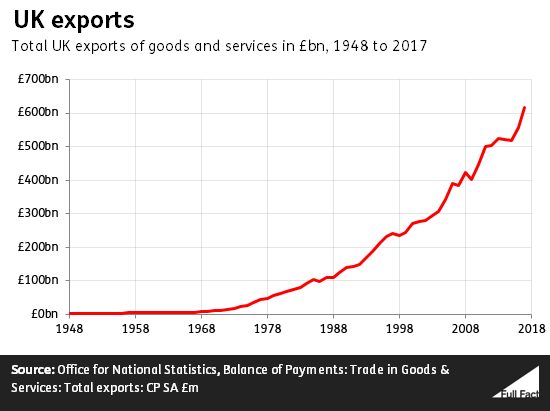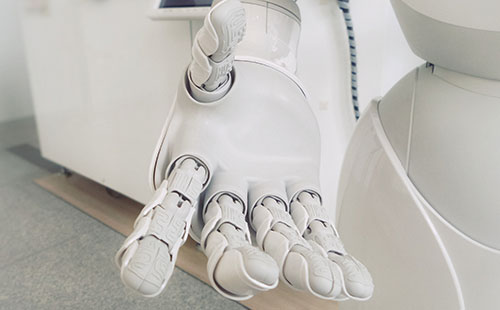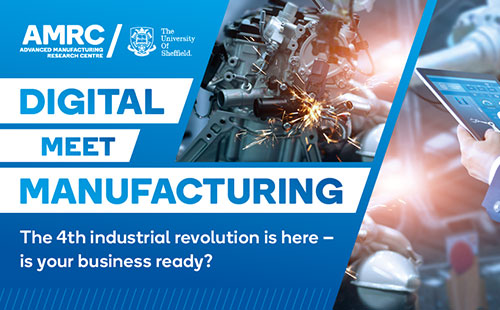Big manufacturers are already moving from automation to optimisation – but a lot of SME manufacturers haven’t even automated yet.
Forget voice-activated AI assistants, they’re still using filing cabinets as document management, and their communications infrastructure is a landline telephone and post-it notes.
Overall, manufacturing is moving in the right direction in the UK.

- The UK’s industrial sector has grown by 1.4% a year since 1948, according to a recent report from the Office of National Statistics (ONS.)
- If current growth trends continue, the UK will break into the Top 5 industrial nations (currently 8th) by 2021.
But SMEs are at risk of being left to rust as the industry moves on to a new age. Though the percentage of jobs in manufacturing has fallen substantially since 1978, the output per job has increased.
.png)
In simple terms, fewer people are producing more than ever before. Which is great. But we stand to lose a chunk of SME manufacturers to global competition if they aren't able to find a way to adapt to this new efficient way of working.
What the big businesses are doing
Large organisations make significant investments into adopting comprehensive digital solutions.
Digital solutions require software purchase, hardware purchase (to support the software), as well as the digital training or recruitment of staff with digital skills to work in a digital environment.
Blockchain technology and AI are showcase examples of technology being adopted by the big hitters in the industry, with huge advantages in efficiency giving a big ROI.
But the cost of entry to these technologies can be out of reach for SMEs.
Entry Cost for AI
Take AI, for example.
A machine learning box has the ability to plug into your Internet of Things (IoT) network and monitor the performance of machines. It learns when machines performance indicators suggest they’re about to breakdown and automatically flags it for repair to your engineering team.

Sounds great, but that will set you back at least £100k at the time of writing. Not to mention, if you don’t yet have an IoT, that’s another investment you’ll have to make. And paying for servers to manage all that data.
So, what is there for SMEs to do?
They might think they’re doing enough by attending Manufacturing Expos and hearing the speakers talk about AI & Blockchain.
But then they hear the price point and dismiss the whole notion altogether. Which is a problem.
SME Manufacturers are throwing the baby out with the bathwater
There are still advancements manufacturers can make. And typically, the thing stopping them from taking these steps aren’t a huge cost barrier, but a lack of awareness.
Because Blockchain and AI are making the biggest impact for the biggest companies, these are the technologies hyped in industry magazines and mainstream media.
SME decision makers are seeing the associated investment costs and immediately declaring themselves out.
However, there are solutions in their price range that will improve their margins. They're just harder to come across without research.
Initiatives like Digital Meets Manufacturing from the Advanced Manufacturing Research Centre in South Yorkshire are designed to make this process easier for SMEs.

Digital transformations can be expensive.
But perpetual innovation can spread the cost of evolving into more digestible investments.
SMEs can advance. Maybe not all at once. But they can, and that’s enough. Enough to make more profit in a time where margins are tightening. Enough to stay competitive when markets are going global.
If they can, why aren’t SME manufacturers digitising?
It's difficult.
Whilst larger companies can afford to pay business or technical advisors, or meet industry leaders who advise on such things, SME manufacturers tend to be smaller outfits with fewer employees.
Smaller operations typically mean a wide range of hands-on responsibilities for the director/manager, meaning less time to educate themselves.
A lot of SME manufacturing companies are multi-generational family businesses. The conventional wisdom passed down is from a bygone era - but new thinking is needed.
And it isn’t just the business owners. If they do adopt new technology, they must then find time to train and upskill their employees to be able to work with it.
The staff may not be able or willing to learn new ways of doing things - yet another barrier to digitisation.
Short-termism.
When it comes to the director’s priorities and mindset, their hands-on management is often difficult to escape.
When machines break or there are large orders to fulfil, these are wolves approaching the door. Being left behind by efficient digital-age competitors isn’t as obvious. It’s the parasite slowly killing them from the inside.
Too busy keeping the wolves at bay, they don’t have the time or the focus to deal with the parasite, or even recognise it’s there.
They’re not directing, they’re managing. And the only thing they're managing is to keep their head above water for another financial year. But in time, that parasite’s going to leave you so weak you’ll be unable to stay afloat.
If you aren’t geared towards technology, how would you know when to adopt it in the first place?
Application of technology is also a huge barrier. Technology alone is only worth the materials it’s made from. It’s only when you know how to apply tech that you see the huge value it can bring.
But herein lies one of the riddles of why SMEs aren't adopting technology. The ones who do are techie and understand the value it brings to the business.
You can get training to maximise the value of technology once you've purchased it. But If you don't know how to use it, then how can you ever judge when the right time to adopt it is?
The crux is that manufacturers are ultimately responsible for learning and understanding their industry and the technology that's driving change. It’s their survival at stake.
During the industrial revolution, the smart people invested into factories.
During the digital revolution, the smart people will invest into digital.
Thanks for reading! If you found this interesting, why not...
Connect with Jonathan Bray to follow the AMRC's Digital Meets Manufacturing journey.
LinkedIn | Twitter
Follow us for more like this!
Arkom Creative Technology
LinkedIn | Twitter | Instagram




